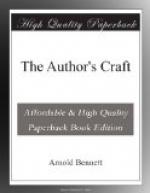There are, by the way, three sorts of created beings who are sentimentally supposed to be able to judge individuals at the first glance: women, children, and dogs. By virtue of a mystic gift with which rumour credits them, they are never mistaken. It is merely not true. Women are constantly quite wrong in the estimates based on their “feminine instinct”; they sometimes even admit it; and the matrimonial courts prove it passim. Children are more often wrong than women. And as for dogs, it is notorious that they are for ever being taken in by plausible scoundrels; the perspective of dogs is grotesque. Not seldom have I grimly watched the gradual disillusion of deceived dogs. Nevertheless, the sentimental legend of the infallibility of women, children, and dogs, will persist in Anglo-Saxon countries.
III
One is curious about one’s fellow-creatures: therefore one watches them. And generally the more intelligent one is, the more curious one is, and the more one observes. The mere satisfaction of this curiosity is in itself a worthy end, and would alone justify the business of systematised observation. But the aim of observation may, and should, be expressed in terms more grandiose. Human curiosity counts among the highest social virtues (as indifference counts among the basest defects), because it leads to the disclosure of the causes of character and temperament and thereby to a better understanding of the springs of human conduct. Observation is not practised directly with this high end in view (save by prigs and other futile souls); nevertheless it is a moral act and must inevitably promote kindliness—whether we like it or not. It also sharpens the sense of beauty. An ugly deed—such as a deed of cruelty—takes on artistic beauty when its origin and hence its fitness in the general scheme begin to be comprehended. In the perspective of history we can derive an aesthetic pleasure from the tranquil scrutiny of all kinds of conduct—as well, for example, of a Renaissance Pope as of a Savonarola. Observation endows our day and our street with the romantic charm of history, and stimulates charity—not the charity which signs cheques, but the more precious charity which puts itself to the trouble of understanding. The one condition is that the observer must never lose sight of the fact that what he is trying to see is life, is the woman next door, is the man in the train—and not a concourse of abstractions. To appreciate all this is the first inspiring preliminary to sound observation.




